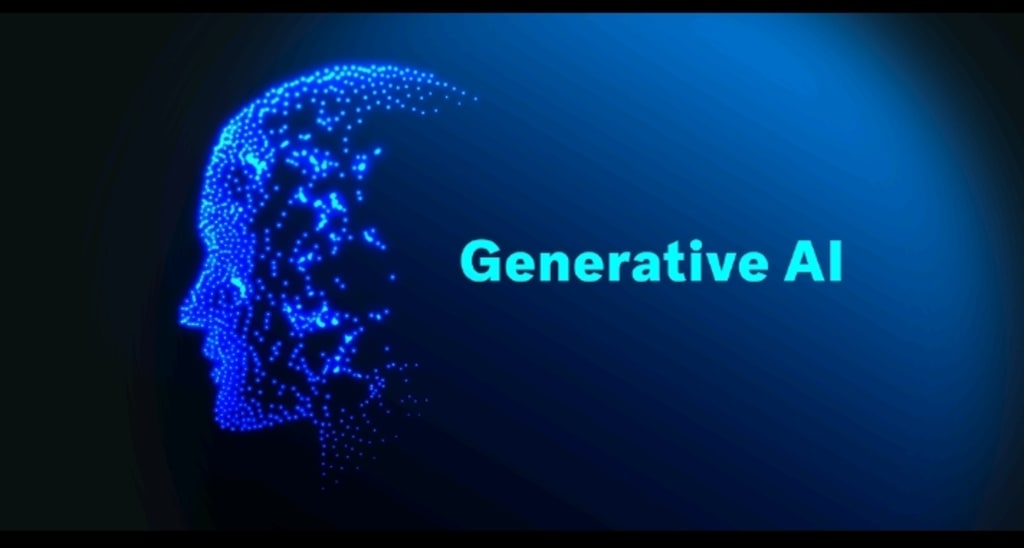The Future Of Generative AI
What Enterprises needs to Know

Generative artificial intelligence (AI) stands at the forefront of a technological revolution that transcends conventional boundaries, offering boundless possibilities across diverse sectors and reshaping the landscape of human-machine collaboration. Its transformative impact extends beyond mere automation, ushering in an era where creativity, innovation, and productivity converge in unprecedented ways.
At the heart of generative AI lies its capacity to create, innovate, and adapt across a spectrum of applications. Whether it be the generation of marketing copy that resonates with target audiences, the creation of visually stunning designs, the composition of melodies that evoke emotions, or the production of videos that captivate audiences – the versatility of generative AI knows no bounds. This adaptability positions generative AI as a transformative force that can seamlessly integrate into a myriad of workflows, augmenting human capabilities and enhancing overall efficiency.
What makes generative AI particularly attractive is its potential to revolutionize collaboration between machines and humans. Rather than displacing human creativity, these AI models function as collaborative tools, enhancing the collective capabilities of knowledge workers. The synergy between human intuition and the computational prowess of AI algorithms results in a formidable partnership that drives breakthroughs in creativity and problem-solving. This collaborative approach is not confined to specific industries; it spans domains, catalyzing advancements in fields as diverse as art, entertainment, education, and beyond.
In the realm of art and creativity, generative AI has become a muse for artists and creators. It serves as a source of inspiration, offering novel perspectives and enabling experimentation that pushes the boundaries of what is traditionally considered possible. From visual arts to music composition and even storytelling, generative AI has become a tool for creatives to explore uncharted territories, fostering innovation and pushing the limits of artistic expression.
Education is another arena where generative AI is making significant inroads. By integrating AI into educational curricula, educators can create personalized learning experiences tailored to individual student needs. Adaptive tutoring systems powered by generative AI can identify learning styles, address gaps in understanding, and provide tailored learning materials, thereby enhancing the overall quality of education. This not only empowers students but also equips educators with valuable insights to refine and optimize teaching methods.
In the business landscape, generative AI is a catalyst for unlocking new sources of value and revenue. Automation of routine tasks, coupled with the augmentation of decision-making processes, allows organizations to achieve operational efficiencies on an unprecedented scale. Whether it's streamlining content generation, enhancing customer service through AI-driven interactions, optimizing product design through generative algorithms, or revolutionizing supply chain management, businesses are leveraging generative AI to drive innovation and stay ahead in competitive markets.
The economic implications of widespread generative AI adoption are profound. Analysts predict a potential surge of up to $8 trillion in global productivity over the next decade. This surge is not confined to a single industry but ripples across sectors, creating a ripple effect that could redefine the economic landscape. From increased operational efficiency to the creation of new markets and the emergence of innovative business models, generative AI has the potential to reshape industries and drive sustainable growth on a global scale.
However, as with any technological advancement, generative AI also raises ethical considerations. As AI systems become increasingly proficient at creating content indistinguishable from human creations, questions of authenticity, ownership, and accountability come to the forefront. Transparent and responsible AI governance is paramount to navigating these complexities, ensuring that the benefits of generative AI are distributed equitably and that potential risks are mitigated with ethical considerations at the forefront.
In conclusion, generative AI represents not just a leap in technological prowess but a paradigm shift in how we approach creativity, collaboration, and innovation. Its ability to transcend traditional boundaries and seamlessly integrate into various aspects of our lives holds the promise of unlocking untapped potential and driving exponential growth across industries. The journey ahead is filled with challenges, but the opportunities presented by generative AI are vast, ushering in a future where the convergence of human creativity and machine intelligence knows no bounds. As we stand at the cusp of this transformative era, one thing is certain: the age of generative AI has only just begun, and the possibilities it holds are as limitless as the human imagination itself.
About the Creator
Enjoyed the story? Support the Creator.
Subscribe for free to receive all their stories in your feed. You could also pledge your support or give them a one-off tip, letting them know you appreciate their work.






Comments
There are no comments for this story
Be the first to respond and start the conversation.